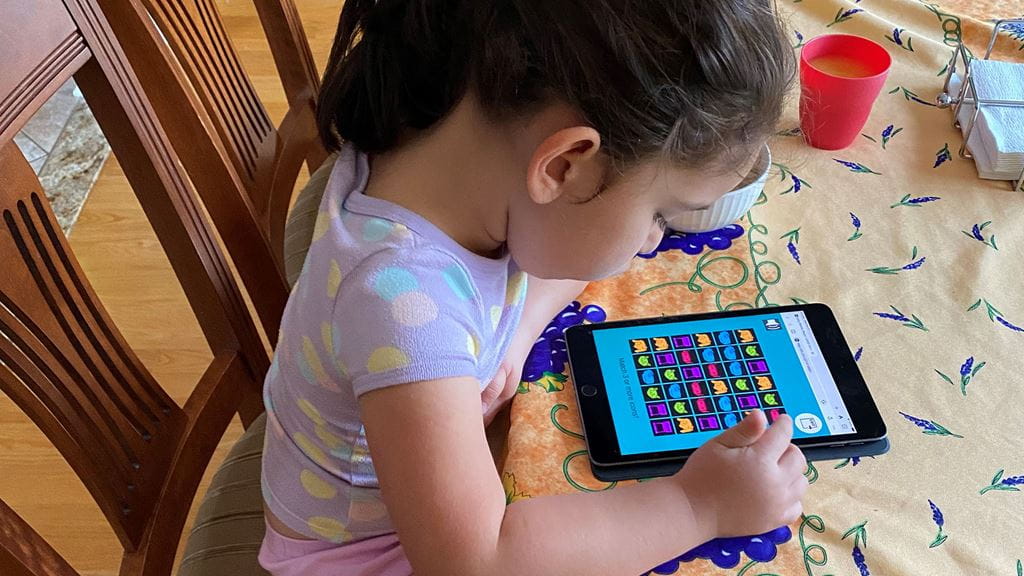
Alumni create resource to help children through the vaccine process
 by Jill Scarrow – Feb 9, 2022
by Jill Scarrow – Feb 9, 2022 When Health Canada approved COVID-19 vaccines for children in late 2021, it ushered in a new phase in the pandemic: the onset of a mass vaccination campaign for children that included disseminating research-based information to parents, and respecting that children need supports that are different from the supports adults need if they go through the immunization process.
Thanks to CARD, an online game created by four Honours Bachelor of Game Design alumni from the class of 2021, parents now have an extra tool they can rely on when they prepare children to receive a vaccine of any kind. Geared to children between the ages of six and 12, CARD walks kids through the process of getting a vaccine, mixing in simple games, stories, and relaxation activities.
“The majority of young children are afraid of needles. The game provides an engaging way of teaching them about ways they can cope with needles so they are more prepared and can have a more positive experience,” says Dr. Anna Taddio, a University of Toronto researcher who developed the clinical best practices the CARD game is based on.
Taddio’s work uses four simple principles: Comfort, Ask, Relax and Distract (or CARD, for short) to reduce fear, pain and other negative outcomes – which can include lifelong vaccine hesitancy or even health-care avoidance – for patients receiving needles, and it’s since been implemented by the Public Health Agency of Canada and the World Health Organization.
In late 2020, Taddio partnered with Immunize Canada, a national coalition that educates the public about immunizations, to turn the elements of CARD into an online game for kids. That’s when they discovered the talents of Sheridan’s game design students.
“The focus of this project was to comfort children during a time when they’re scared, but obviously it’s happening during a time when it’s probably needed more than it would’ve been in the past. Working on something that’s actually going out there to make a difference is very important to me.”
– Joshua Jewer
Sebastian Swarney got started on the game through a connection to the head developer, a University of Waterloo math student named Anthony Ilersich. Swarney and Ilersich began creating a concept for the game in late 2020, and by January 2021 Swarney knew he’d need help to finish the project. He turned to classmates Tyler Tam, Wulusi Zhang and Joshua Jewer. The team took up the project on evenings and weekends, all while simultaneously completing their capstone projects during the last year of Bachelor of Game Design program.
The project gave them a unique challenge: transfer a body of research in a guideline for health providers into a game for kids. Swarney says working with academic researchers on approvals for the project was a completely new experience, but it was instructive to help the team develop clear, concise design and characters’ dialogue to ensure the game flowed in a way that respected the elements of the guideline and was clear to children.
“It wasn’t a super technically complex project, it was way more design complex and it had that much more care and review put into everything,” he recalls.
Designing for kids brings new challenges
Turning each element of the CARD concept into a kid-friendly narrative turned out to be the perfect way to tackle the project. It was up to Zhang, who served as the game’s art director, to design friendly characters who children can recognize and relate to at each step of the CARD process. Coco the cat shows you how to get comfortable before the needle. Atom the Android lets kids know it’s OK to ask questions. Rex the T-Rex offers tips to relax, and Doodle the dog has fun games kids can use to distract themselves.
“I guess it’s like giving (kids) chocolate-covered broccoli,” Zhang explains. “It was a challenge: how do you associate something that they don’t see in a positive light with something that is positive?”
Jewer says creating CARD also showed him that assumptions he’s used in the past when developing games for adults don’t apply to the elementary-school set. Without a lifetime of experience playing games, Jewer says children need more guidance to follow the steps through the game, something that had to be incorporated into the design and dialogue. Working with children, who were always ready to provide straightforward feedback during the testing process, was also eye-opening.
“Seeing the kids interact with it was always fun. Sometimes (they said) ’Oh wow, I love that character.’ Or, other times, they were just completely deadpan and would say: I don't like that.”
Overall though, working on CARD has opened new avenues in Jewer’s freelance career and he now gets requests to work on other children’s games. Plus, he admits it’s been a special chance to put a bit of good out into the world. Since its launch in late 2021, CARD has already been accessed 6,000 times.
“The focus of this project was to comfort children during a time when they’re scared, but obviously it’s happening during a time when it’s probably needed more than it would’ve been in the past,” he says. “Working on something that’s actually going out there to make a difference is very important to me,” he says.
Tam agrees. He says the opportunity to give health providers, parents and children themselves a tool to get through another phase of the pandemic was a remarkable way to start his career, and will stay with him long after the vaccine clinics close their doors. “This is probably the biggest project that we've done in terms of how many people will end up playing it,” he says. “Having that kind of reach and impact is nice.”
Photo provided by Immunize Canada
Media Contact
For media inquiries, contact Sheridan’s Communications and Public Relations team.





